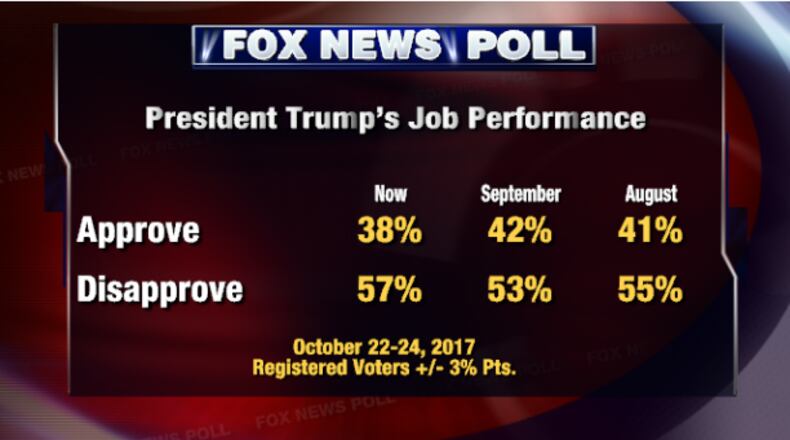We're still a year away from the 2018 midterms, but I don't think I've ever seen a poll with such ominous news for a political party as the latest Fox News poll holds for Republicans.
In the last month, President Trump's job-approval number has dropped four points, from 42 percent to 38 percent. It is down 10 points since February. In the last month, it has dropped precipitously, from 68 percent to 56 percent, among white men without a college degree, which is his core group of supporters. Among independents, his job approval rating is now just 30 percent. And according to Fox News, Obamacare is now viewed favorably by 52 percent of Americans, and unfavorably by 44 percent.
Nine months into his presidency, most Americans have also concluded that Trump lacks the knowledge (38 percent yes/60 percent no), judgment (37/60) and compassion (37/60) to function adequately in the Oval Office.
OK, are you ready for the bad news now?
Back in the 2010 midterms, the Republicans gained 63 seats in the House, easily recapturing the majority, and picked up six seats in the Senate. It was the biggest mid-term transformation of Congress since way back in 1938. That historic performance had been widely predicted, thanks to polls asking voters whether they would support an unnamed Republican or unnamed Democrat for Congress. On that so-called generic ballot question that year, Republicans enjoyed a huge, nine-point advantage.
On the generic ballot question this year, the new Fox poll gives Democrats a 15-point advantage.
Longer term, the portends for the party are even more disastrous. Among voters aged 45 and younger, 71 percent have an unfavorable opinion of Trump, while just 26 percent view him favorably. That's a 45-point differential. On the generic ballot question, just 25 percent of younger voters say they intend to vote Republican next year, while 55 percent intend to vote Democratic. In generational terms, we've never seen anything like that before.
Once put in place, such party affinities tend to be like tattoos -- you can erase them, but the process is costly and painful. And with American politics becoming ever more tribal, and with political identity becoming part of a person's "brand" among friends and family, that's probably more true than ever.
Again, the midterms are still a year away, but these numbers have to be frightening, particularly because they are backed up by findings by other pollsters. And as far as I can tell, the Republican strategy to reverse these trends consists of two basic components:
1.) Continue to purge any elements in their party that dare to challenge Trump, such as Sen. Jeff Flake of Arizona and Sen. Bob Corker of Tennessee, and replace them with more extreme candidates who pledge unquestioned loyalty to an increasingly unpopular president. It's as if the GOP is trapped in an abusive relationship with a boyfriend whom nobody else likes or trusts, but instead of trying to get out, its reaction is to tell everyone else to go to hell and to double-down on the relationship.
It is not usually an approach that produces a good outcome.
2.) Pass a major tax-cut plan that will give Republicans something to brag about on the campaign trail. After their disastrous failure to repeal and replace Obamacare, GOP leaders have convinced themselves that they need something to brag about as an accomplishment, and they see a huge tax cut as their only hope. (They also need it to placate their wealthy donors.)
However, that pesky Fox poll again suggests real trouble. It tells us that 78 percent of Americans are "frustrated that the wealthy pay too little in taxes," and that 85 percent are frustrated by "corporations using loopholes to avoid taxes." Maybe it's just me, but building your comeback hopes around a policy that is opposed by eight out of 10 American voters -- and by six out of 10 members of your own party -- doesn't sound all that bright.
But as Barack Obama said to Mitt Romney, "please proceed, governor."
About the Author
The Latest
Featured


